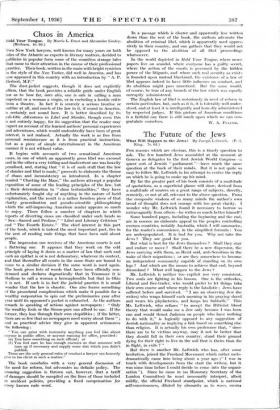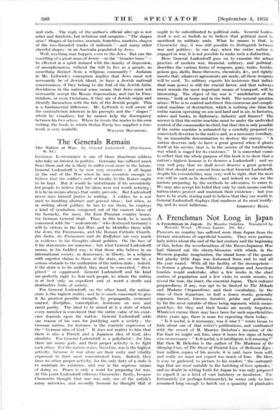The Future of the Jews
FOR reasons which are obvious, this is a timely question to ask. The few hundred Jews assembled at the moment at Geneva as delegates to the first Jewish World Congress—a queer sort of Jewish " parliament "—have much the same question at the back of their minds. But it is not quite so easy to follow Mr. Leftwich in his attempt to evolve the reply on which he is going to make up his mind.
By far the greater part of his book consists of a multitude of quotations, as a superficial glance will show, derived from a multitude of sources on a great range of subjects, directly, remotely, or not at all, relevant to the above question. From the composite wisdom of so many minds the author's own trend of thought does not emerge with too great clarity. I wonder why Mr. Leftwich found it necessary to borrow so extravagantly from others—he writes so much better himself !
Some hundred pages, including the beginning and the end, are in essence an elaborate appeal to the peoples controlling oversea countries, notably Australia, which I will summarise, for the reader's convenience, in the simplified formula : You are underpopulated. It is bad for you. Why not take the Jews ? They are good for you.
But what is best for the. Jews themselves ? Shall they stay and endure or move ? Shall there be a new dispersion, the Jews carrying with them, as Herzl said, anti-Semitism in the wake of their migrations ; or are they somewhere to become an independent community capable of standing on its own legs ? And which are the means to achieve that end, beyond dreamland ? What will happen to the Jews ?
Mr. Leftwich is neither too explicit nor very consistent. Two souls are fighting in his bosom. One is the orthodox, Liberal and free-trader, who would prefer to let things take their own course and whose reply is the fatalistic : Jews have suffered before and survived. " I 'am an observing Jew (he writes) who wraps himself each morning in his praying shawl and wears his phylacteries, and keeps his Sabbath." This Mr. Leftwich, who refuses " to accept the Hitlerist blood theory that would make me a Jew only because I was born one and would thrust Judaism on people who have nothing to do with it," is logically opposed to any suggestion of Jewish nationality as implying a link based on something else than religion. It is actually his own preference that, since there are to be victims anyway, may it not be better that they should fall in their own country, stand their ground dying for their right to live in the soil that is theirs than die in flight, in exile ? "
But there is another Mr. Leftwich who has, after some hesitation, joined the Freeland Movement which rather melo- dramatically came into being about a year ago (" I was in touch, ',kith developments from the start (he writes), but it was some time before I could decide to come- into the organi- , sation "). Since he came in (as Honorary Secretary of the London Committee) he must necessarily interpret, albeit mildly, the official Freeland standpoint, which is national self-consciousness, diluted by obscurity as to ways, means and ends. The reply of the author's official alter ego..is not sober and fatalistic, but nebulous and sanguine : " The shapes arise ! Shapes of factories, arsenals, foundries, markets, shapes of the two-threaded tracks of railroads "—and many other cheerful shapes—in an Australia populated by Jews. • Well, anything may happen, even to the Jews. But can the resettling of &great mass of Jewry—on the "-broader basis"— be effected in a spirit imbued with the inanity of dispersion, of amorphousness, without the will to live as a people, as something distinct from a religious community ? Judaism in Mr. Leftwich's conception implies that Jews must not necessarily be of Jewish blood, or have a Jewish national consciousness, if they belong to the fold of the Jewish faith. Jewishness in the national sense means that Jews must not. necessarily accept the Mosaic dispensation, and can be Free- thinkers, or even_ Christians, if they are of Jewish origin and identify themselves with the fate of the Jewish people. This. is a fundamental difference. Mr. Leftwich is well aware of the contradiction inherent in his precepts and the " shapes " which he visualises, but he cannot help the discrepancy between his two selves. Where he treats the reader to his own writing, the book; to which Stefan Zweig has supplied a fore-







































 Previous page
Previous page